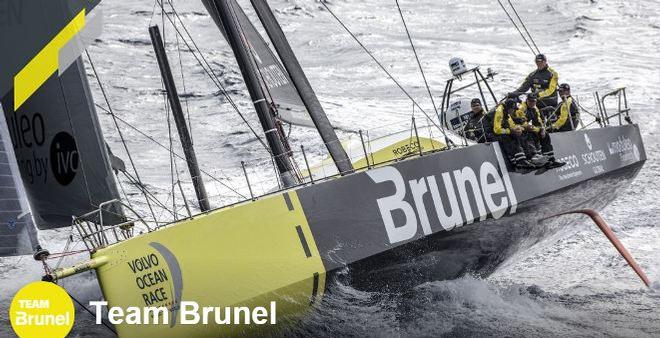Volvo Ocean Race - Big challenges for Team Brunel in extreme weather
by Robbert-Jan Metselaar on 5 Mar 2015

Team Brunel - Volvo Ocean Race 2014-15 Stefan Coppers/Team Brunel
Volvo Ocean Race 2015 - Sailing on board a lightning-fast racing yacht in extreme weather conditions involves risks. For example, Gerd-Jan Poortman injured his arm on the last leg, and onboard reporter Stefan Coppers sustained a slight burn. There’s also the risk of infectious diseases. Pablo Arrarte learned this to his cost when he was laid low with influenza. All of this happened in the middle of the ocean, far removed from a doctor or hospital.
'The big difference from being at home is that on board you have hardly any opportunity to rest,' says team doctor Jan Maerten Smit. According to Smit, who works as a plastic surgeon at the VU Medical Centre in Amsterdam, Volvo Ocean Race sailors have less ability to recover from illness than the rest of us. 'Living on board takes an unbelievable amount of energy. If you were at home, you would stay in bed but on a Volvo Ocean Race boat you always have to go on watch.'
The Team Brunel sailors are always able to contact Smit, his fellow doctor Maarten Staarink and physiotherapist Mark Haak. 'If there are problems on board, Maarten, Mark or I get an email asking for medical help. This applies only for non-emergencies. When Gerd-Jan bruised his arm, we provided advice by email. In real emergencies, they can phone us. We have a so-called calamity protocol for this. Apart from that, Bouwe Bekking makes the decisions. He’s the skipper and is best able to assess the situation on board.'
If a sailor sustains a bruise or a torn muscle during the leg, he will be treated during the stopover by physiotherapist Mark Haak, who formerly worked with Ajax’s football players and various Olympic athletes. 'When Gerd-Jan arrived in Auckland, I examined him,' says Mark Haak. 'We call that a functional movement examination. This showed that there was a small tear in the muscle that operates the wrist. This injury meant that he could not fully move one of his fingers, so we splinted that to the finger next to it. Exercise therapy is also an important part of the healing process.'
Smit makes a distinction between infectious diseases, stress injuries and accidents. 'Influenza is bothersome but not really serious. If you take the right measures, influenza will just go away. You get influenza or a cold through reduced resistance to infection. This is why you have to continue to eat and drink properly. You cannot entirely avoid an infectious disease. If someone falls ill, you have to take measures to prevent the virus spreading to the rest of the crew.
Good hygiene is extremely important in such cases. For example, when Pablo was sick, he ate from a separate bowl. He was also allowed more rest. Then you have stress injuries. These come from repetitive movements, such as operating winch handles for long periods. The complications that sailors can get are a bit more serious – such as those following an accidental fall or trapping your hand between a sheet and a winch, for example. Bruises, broken bones, inflamed tendons or cuts are pretty difficult to treat on board a rolling, pitching yacht.'
For these serious complications, the team doctors are called in. 'I’m sure that the boys are well able to assess whether or not they should contact us. In fact, they aren’t obliged to do so, but I’ve told them that I would prefer to have too much contact with them than too little.'
'These guys have got great problem-solving skills,' continues Jan Maerten. 'They are all pretty level-headed too. During my work at the VU Medical Centre I often come across medical students who still find it very scary to administer a drip. On the other hand, during their medical training, the Team Brunel men didn’t hesitate. The man pushed the catheters into the right blood vessels of their fellow crewmen without batting an eyelid.'
The catheters, bandages and medicines are packed in two watertight chests. 'They can get medicines from one of the chests as they think fit. This chest contains products like plasters, simple bandages and painkillers. Then they have a sealed chest from which they can only use medicines with permission. These include such things as catheters and stronger drugs. Thanks to their intensive medical training, and the medical advice that we provide, the sailors can do a lot for themselves, such as stitches, plaster casts and, as I said, administering medicines intravenously.'
But prevention is better than cure. 'Of course we want to push the boat to the limit and win the Volvo Ocean Race,' said skipper Bouwe Bekking earlier. 'But then with nine healthy guys on board. If the conditions get too dangerous, we’ll just put a bit of pressure on the brake pedal.'
If you want to link to this article then please use this URL: www.sail-world.com/132091